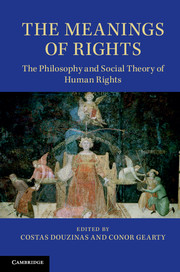Book contents
- Frontmatter
- Contents
- Notes on contributors
- Introduction
- Part I Finding foundations
- 1 On human rights: two simple remarks
- 2 Human rights: the necessary quest for foundations
- 3 Against human rights: liberty in the western tradition
- 4 Religious faith and human rights
- Part II Law, rights and revolution
- Part III Rights, justice, politics
- Part IV Rights and power
- Index
- References
3 - Against human rights: liberty in the western tradition
Published online by Cambridge University Press: 05 June 2014
- Frontmatter
- Contents
- Notes on contributors
- Introduction
- Part I Finding foundations
- 1 On human rights: two simple remarks
- 2 Human rights: the necessary quest for foundations
- 3 Against human rights: liberty in the western tradition
- 4 Religious faith and human rights
- Part II Law, rights and revolution
- Part III Rights, justice, politics
- Part IV Rights and power
- Index
- References
Summary
Prelude: liberalism, sovereignty and political economy
Political economy, the most developed form of liberalism, was, in the longest perspective, built upon two specifically modern concepts: first of all rights, and secondly sympathy. The notion of sympathy is in many ways in tension with the notion of rights and even derives from sources resistant to ideas of subjective right and cognate concepts of social contract as founding the political order. Indeed, for the most part a direct, interpersonal exercise of sympathy was relegated by Adam Smith and other thinkers of the Scottish Enlightenment to the sphere of ‘civil society’ which lies outside the economic order, even though the latter was still crucially regarded as embedded within it – an assumption later lost to view within a later, more drastic elaboration of the liberal credo. Already for Smith, within the order of the properly ‘economic’, sympathetic, mutual goals are to be achieved indirectly, through a ‘providential’ and unintended co-ordination of sheerly egotistic purposes, politically legitimated in terms of ideas of subjective entitlement.
Such a notion of ‘right’ grounds the politically economic idea of person, property and contract. But here one can claim that, whenever the notion of sympathy was subordinated through indirection – or, in other terms, the idea of a reciprocalist pursuit of common ends is denied to be constitutive of the political foundation – then the idea of individually based natural rights, appealing to the normativity of negative freedom, was from the outset correlated with an absolutist account of the sovereignty of the centralised state. In the case of Scots political economy this link re-emerges with James Stewart, who gave a more honest account than Adam Smith of the role that the state, empire and military conquest must play in processes of primacy accumulation. He explicitly stated that ‘the Republic of Lycurgus [ancient Sparta] represents the more perfect plan of political economy – anywhere to be met with, either in ancient or modern times’.
- Type
- Chapter
- Information
- The Meanings of RightsThe Philosophy and Social Theory of Human Rights, pp. 39 - 70Publisher: Cambridge University PressPrint publication year: 2014
References
- 2
- Cited by



